
PREV ARTICLE
NEXT ARTICLE
FULL ISSUE
PREV FULL ISSUE
COLONIAL PAPER RARITIES IN NEWMAN PART VIIICatalogers Bruce Hagen and Maureen Levine submitted some great Colonial paper money selections from the upcoming Heritage Eric P. Newman Collection VIII sale. Thanks! -Editor
Exceptional Colonial Offerings in Newman Part VIII Currency Auction Selections from the Eric P. Newman Collection Part VIII will be offered November 1 and 2 at Heritage Auction’s world headquarters in Dallas in conjunction with the Newman Part IX coin sale (November 1 and 3). Exceptional unreserved Colonial notes are featured, and a few of the many highlights are detailed below. Lot 28038: Maryland July 14, 1756 20 Shillings 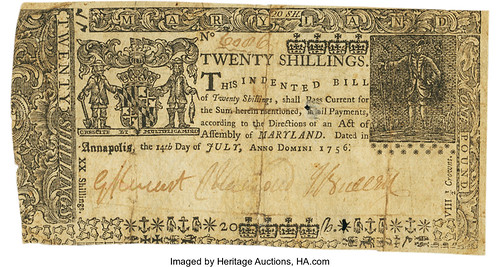 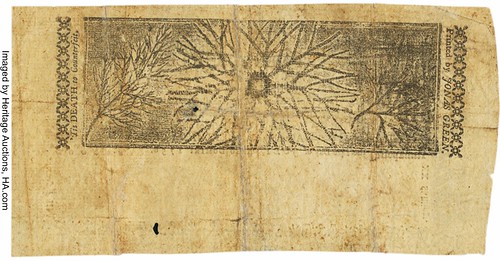 The exceedingly rare July 14, 1756 Maryland 20 shillings note is so seldom encountered, the only auction record we have located is from the Roper sale in 1984. Boyd did not own an example from the series, and very few are held in private collections. This example has a nature-print back and was boldly printed by Jonas Green. Another opportunity to own one of these underrated rarities might not arise for another three decades. To read the complete lot description, see: Lot 28111: Pennsylvania August 1, 1744 1 Shilling  Notes printed by Benjamin Franklin are always in demand. This finest known, and likely unique, August 1, 1744, Pennsylvania shilling has the added benefit of a stellar EF 45PPQ grade. This beautifully detailed example is the Newman plate note. Although Boyd had two notes from the issue, they could not approach the virtually pristine condition seen here. Colonial notes circulated quite a bit, and collectors in this area have to get used to seeing many well-worn examples. Early high-condition specimens are rare. This one is stunning.
-Editor
To read the complete lot description, see: Lot 28132: Rhode Island February 14, 1743 2 Shillings 6 Pence 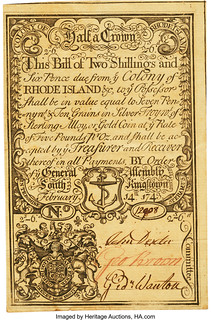 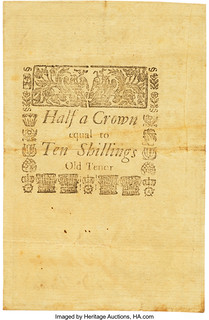 Another Newman plate note in stellar condition is the Rhode Island February 14, 1743 “Tall” Bill of Credit. Only Roper had an example, which had splits and faults, and that was sold in 1984; the Boyd collection examples were all redated plate notes. Beautifully engraved and boldly printed, this is a priceless treasure. Another great high-grade early piece. Here's more from the catalog description. -Editor
The engraved face plate, which was subsequently redated for a few more issues, is one of the most handsomely designed plates in the 1690-1750 New England Bill of Credit issuing period. The cartouche occupying the top two thirds of the note contains the obligations; the sides show floral details; the Rhode Island anchor motif symbolizing Hope is at bottom center; and the top displays fancy engraved details in the corners with "Half a Crown" in the center. Outside of the cartouche, at the bottom left, are the Royal Arms with the Garter crest and motto at center. The back is simpler, with an ornamental square cartouche composed of mixed types such as crowns, urns, plumes and roses. At center is "Half a Crown / equal to / Ten Shillings / Old Tenor." A very bold note with three clear signatures and serial no. 12908 at the lower right. A deeply inked, strong plate was used to print this note. To read the complete lot description, see: Lot 28138: South Carolina August 27, 1715 Act 4 Pounds 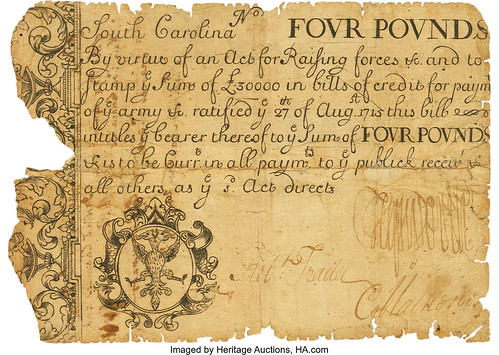 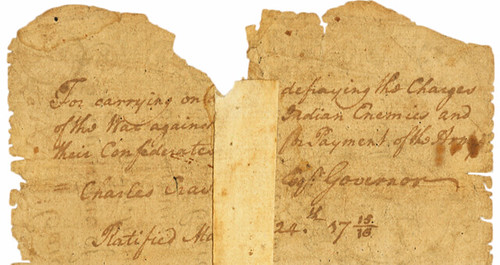 The third Newman plate note, and the finale in these highlights, is the unique and impressive South Carolina August 27, 1715 Act 4 pounds note for “Raising forces” to quell the Native American uprising. This is the earliest confirmed Southern Colonial bill and a tangible artifact of the Yamassee War, a key event in South Carolina’s history with an impact comparable to that of King Philip’s War in New England. Although with some faults, this is on a par with the most significant of all Colonial issues and will be a centerpiece of the next cabinet it enters. Here's more from the catalog description. -Editor
This 1715 Proprietary period Bill of Credit is equal in stature to the most significant Colonial notes known. It is the earliest confirmed southern Colonial bill. Due to its direct use for military funding at the onset of the Yamassee War and other engagements with Native Americans, it is comparable to the 1690/91 Massachusetts bills used to pay for the unsuccessful military expedition to Quebec. Under proprietary rule, the Colony was loosely governed by the aristocratic elite whose commercial aims were to expand territory, increase agricultural output (particularly rice), and facilitate commerce. The British traded widely with the Native Americans, who engaged in selling them captured slaves from rival tribes (whether for monetary gain or to pay off escalating debts with British traders) in addition to goods such as deerskins. As further land was needed for rice production, the British expanded more aggressively into Yamassee territory, and trading practices with these Native American "allies" became more predatory. The resulting atmosphere of discontent and mistrust led to the 1715-1717 Yamassee War. On April 15, 1715, the Yamassee attacked and killed trade officials in Pocataligo. A week later, Governor Craven responded with military force. Other tribes across the southern region rose up (some in solidarity, and others because they were no longer confident of the British keeping their promises), attacking colonists and killing hundreds including most of the traders. Like King Philip's War in New England, the Yamassee War outcome would be a key event in the survival of the Colony, where much already had been invested in the slave economy and development of ports like Charles Town (Charleston). The last major battle occurred in July 1715 (although skirmishes would last until 1717). The Yamassee began moving south the following month, after the Colony received replenishments of supplies, an act funding a large militia was passed, and ten forts were erected. The war contributed to the Lords Proprietors eventually losing influence and South Carolina becoming a Crown colony. To read the complete lot description, see: Bidding has begun, and we invite you to view the exciting Newman VIII notes at HA.com/3547 as well as the Newman IX coins at HA.com/1260 . 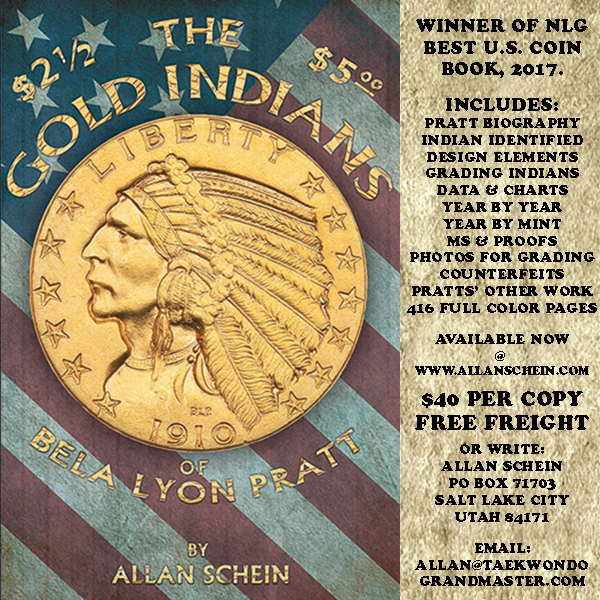 Wayne Homren, Editor The Numismatic Bibliomania Society is a non-profit organization promoting numismatic literature. See our web site at coinbooks.org. To submit items for publication in The E-Sylum, write to the Editor at this address: whomren@gmail.com To subscribe go to: https://my.binhost.com/lists/listinfo/esylum All Rights Reserved. NBS Home Page Contact the NBS webmaster 
|